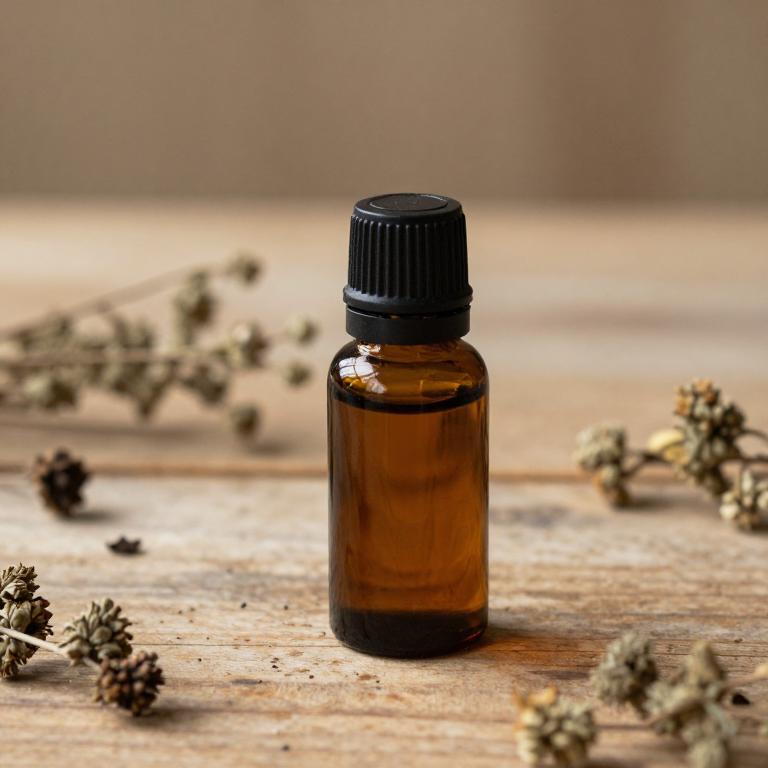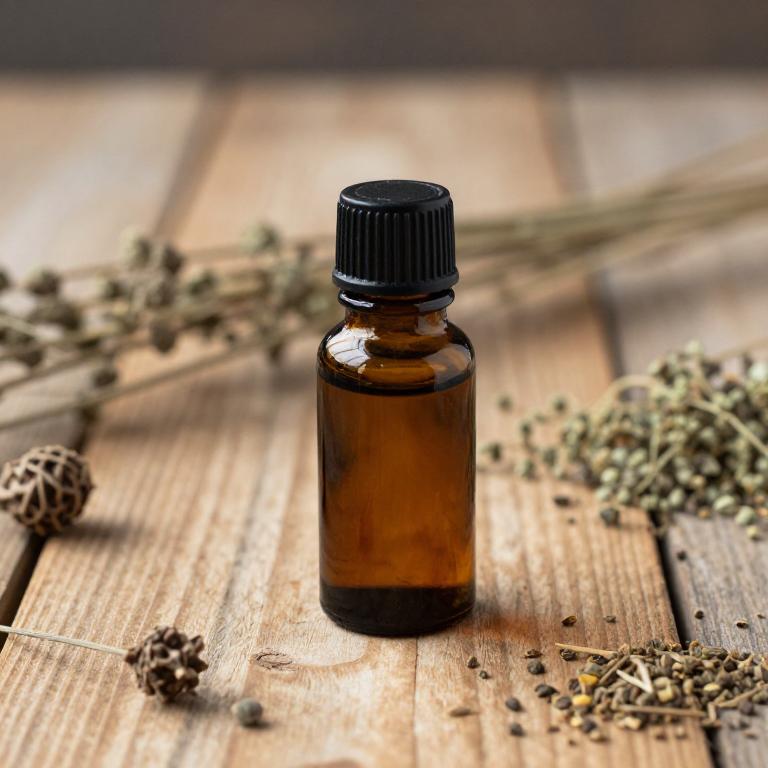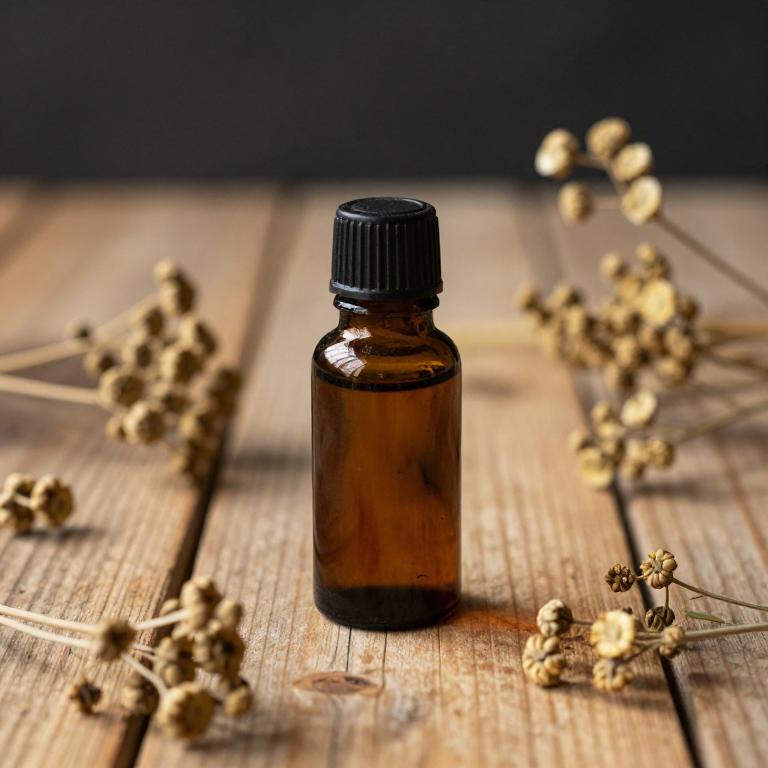10 Best Herbal Essential Oils For Burping

Herbal essential oils can be beneficial for alleviating burping by soothing the digestive system and reducing excess gas.
Oils such as peppermint, ginger, and fennel are commonly used for their carminative properties, which help ease bloating and discomfort. When diluted properly with a carrier oil, these essential oils can be applied topically to the abdomen or inhaled via a diffuser to promote digestion. However, it is important to consult with a healthcare professional before use, especially for individuals with existing medical conditions or allergies.
Overall, herbal essential oils offer a natural and holistic approach to managing burping and related digestive issues.
Table of Contents
- 1. Black pepper (Piper nigrum)
- 2. Ceylon cinnamon (Cinnamomum verum)
- 3. Ginger (Zingiber officinale)
- 4. Peppermint (Mentha piperita)
- 5. Fennel (Foeniculum vulgare)
- 6. Rosemary (Rosmarinus officinalis)
- 7. Eucalyptus (Eucalyptus globulus)
- 8. Citrus sinensis
- 9. Cumin (Cuminum cyminum)
- 10. Caraway (Carum carvi)
1. Black pepper (Piper nigrum)

Piper nigrum, commonly known as black pepper, contains essential oils that may offer potential benefits for reducing burping.
The essential oils in black pepper, such as piperine, can aid in improving digestion by stimulating the production of digestive enzymes. These oils may help to alleviate bloating and gas, which are common causes of burping. However, it is important to use these oils in moderation, as they can be potent and may cause irritation if overused.
While some people may find relief from burping using black pepper essential oils, it is advisable to consult a healthcare professional before incorporating them into a health routine.
2. Ceylon cinnamon (Cinnamomum verum)

Cinnamomum verum, also known as true cinnamon, contains essential oils that have been traditionally used to aid in digestion and relieve symptoms like burping.
The essential oil derived from its bark contains compounds such as cinnamaldehyde and eugenol, which possess mild antispasmodic and carminative properties. When used in aromatherapy or diluted in a carrier oil, cinnamon essential oil may help soothe digestive discomfort and reduce excess gas, thereby alleviating burping. However, it is important to use it in moderation and consult with a healthcare professional before incorporating it into a health routine.
While some people may find it beneficial, individual reactions can vary, and it should not replace medical advice or treatment for persistent digestive issues.
3. Ginger (Zingiber officinale)

Zingiber officinale, commonly known as ginger, is widely used in herbal essential oils for its digestive benefits, including the relief of burping.
The essential oil of ginger contains bioactive compounds such as gingerol and shogaol, which can help reduce gas and bloating by stimulating digestion and relaxing gastrointestinal muscles. When used in aromatherapy or diluted in a carrier oil, ginger essential oil may help alleviate the discomfort associated with excessive burping. It is often recommended for individuals experiencing indigestion or nausea alongside burping.
However, it is important to consult a healthcare professional before using ginger essential oil, especially for those with existing medical conditions or allergies.
4. Peppermint (Mentha piperita)

Mentha piperita, commonly known as peppermint, is a popular herb used in the production of essential oils that are often recommended for relieving symptoms associated with burping.
The essential oil of peppermint contains potent compounds like menthol, which can help soothe the digestive system and reduce the frequency of burping by calming the muscles in the gastrointestinal tract. When used in aromatherapy or as a topical application, peppermint essential oil may help alleviate the discomfort caused by excess gas and indigestion. However, it is important to dilute the oil properly before use to avoid skin irritation.
While peppermint essential oil can be a helpful natural remedy for burping, it should not replace professional medical advice, especially for individuals with chronic digestive issues.
5. Fennel (Foeniculum vulgare)

Foeniculum vulgare, commonly known as fennel, is a herb widely used in aromatherapy for its digestive benefits, including its effectiveness in helping with burping.
The essential oil of fennel contains compounds like anethole and fenchone, which have carminative properties that can relieve gas and reduce bloating. When used in diffusers or applied topically (diluted with a carrier oil), fennel essential oil can help soothe the digestive system and ease discomfort associated with excessive burping. It is often recommended for individuals experiencing indigestion or reflux-related burping.
However, it should be used with caution, as it may cause irritation if not properly diluted.
6. Rosemary (Rosmarinus officinalis)

Rosmarinus officinalis, commonly known as rosemary, is a herb whose essential oil has been traditionally used for its aromatic and therapeutic properties.
The essential oil of rosemary contains compounds like pinene and camphene, which may help in reducing bloating and promoting digestion, potentially alleviating symptoms of burping. It is often used in aromatherapy or diluted in a carrier oil for topical application, offering a natural remedy for digestive discomfort. While it is generally considered safe, it is important to consult a healthcare professional before using rosemary essential oil, especially for those with existing health conditions or during pregnancy.
Its refreshing scent also makes it a popular choice for creating a calming environment that supports overall well-being.
7. Eucalyptus (Eucalyptus globulus)

Eucalyptus globulus, commonly known as eucalyptus camphoraceous, is a versatile essential oil derived from the leaves of the eucalyptus tree, widely used in aromatherapy and natural remedies.
When used for burping, it can help soothe digestive discomfort by promoting respiratory clarity and easing the pressure in the upper abdomen. Its refreshing scent may encourage deeper breathing, which can aid in expelling trapped air from the stomach. However, it should be diluted properly before use to avoid skin irritation or adverse reactions.
While it is not a direct treatment for burping, it can be a supportive element in managing symptoms associated with digestive issues.
8. Citrus sinensis

Citrus sinensis, commonly known as sweet orange, is a citrus fruit whose essential oil is widely used in aromatherapy and natural remedies.
The essential oil of Citrus sinensis is known for its uplifting and calming properties, which can help reduce stress and anxiety, both of which may contribute to excessive burping. When inhaled or used in diffusers, the oil can soothe the digestive system and ease gastrointestinal discomfort, potentially reducing the frequency of burping. Its antispasmodic and anti-inflammatory effects may also help alleviate symptoms of indigestion and bloating that often lead to burping.
However, it is important to use this essential oil in diluted form and consult with a healthcare professional before incorporating it into a regular wellness routine.
9. Cumin (Cuminum cyminum)

Cuminum cyminum, commonly known as cumin, is a spice that also yields a valuable essential oil with potential benefits for digestive health.
The essential oil of cumin is often used in aromatherapy and natural remedies to aid in reducing bloating and alleviating discomfort associated with burping. Its warming properties may help stimulate digestion and ease the buildup of gas in the stomach. When used in diffusers or diluted for topical application, cumin essential oil can support digestive wellness.
However, it is important to consult a healthcare professional before using essential oils, especially for individuals with existing health conditions or during pregnancy.
10. Caraway (Carum carvi)

Carum carvi, commonly known as caraway, produces an essential oil that has been traditionally used to alleviate symptoms of burping and digestive discomfort.
The oil contains compounds like limonene and alpha-pinene, which are known for their carminative properties, helping to expel gas from the digestive tract. When used in aromatherapy or diluted in a carrier oil, caraway essential oil can soothe the stomach and reduce the frequency of burping. It is often recommended for individuals experiencing excessive gas or indigestion.
However, it is important to consult a healthcare professional before using caraway oil, especially for pregnant women or those with existing health conditions.